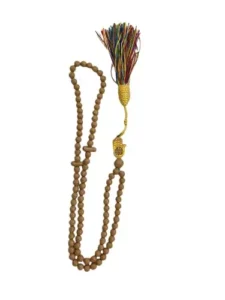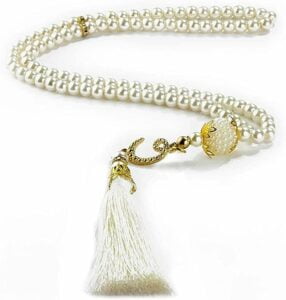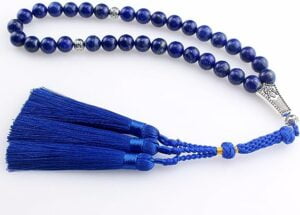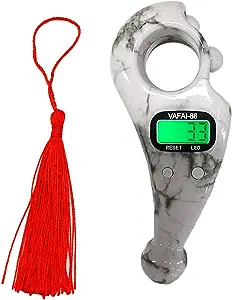Prayer beads are also called Misbaha or Islamic rosary. Prayer beads are the string of beads used by Muslims to count our prayers and glorify Allah SWT. During the era of Prophet Muhammad (PBUH), people of his Ummat used to count on their hands, and we can see this still happening today.
The first prayer beads, known as Tasbih, were crafted by Bibi Fatima Zahra (may Allah be pleased with her), the cherished daughter of Prophet Muhammad (peace be upon him).
She ingeniously fashioned these tasbihs by tying multiple knots on a string, creating bead-like structures to help her keep count of her dhikr (remembrance of Allah SWT) during her devotions.
It is recounted that the Prophet Muhammad (PBUH) entrusted her with three concise and special dhikrs to recite after each of the five daily prayers. She would repeat each of these dhikrs either 33 or 34 times, resulting in most Tasbihs having 99 or 100 beads.
Interestingly, when we explore the etymology of the word “bead” itself, it appears to have its roots in Old English, where “gebed” or “bede” meant prayer. In the earlier days of Islam, Tasbihs were also crafted from date seeds.
Understanding Misbaha: Names and meanings simplified.
Arabic beads are unique beads that Muslims use to perform Dhikr and remember Allah SWT. The Arabic beads are called (Misbaha) مِسبحة or سبحة (Sibha). The act of performing Dhikr is called Tasbih, and there are different Tasbih’s.
This way, people remember how many times they say the specific Dhikr. The Islamic Misbaha consist of 99 beads or 33 beads.
What do the arabic beads means?
Key terms
- Tasbeeh (تسبيح): It means counting or reciting special prayers using prayer beads.
- Misbaha (مِسبحة) or Sibha (سبحة): These words are for the prayer beads themselves, like a string of beads.
- Sibah (سِبح): This is the plural form of “Misbaha” or “Sibha,” meaning many sets of prayer beads.
What is the purpose of Tasbih (Prayer beads)?
Prayer beads are like a handy tool that helps people count when they talk to God by saying particular words. For instance, if you want to say “Astaghfirullah” 100 times to ask for forgiveness, you can use Misbaha to keep track easily. It makes it simpler and more organized.
- Understanding Misbaha: Names and meanings simplified.
- What do the arabic beads means?
- What is the purpose of Tasbih (Prayer beads)?
- Prophet Muhammad (PBUH) on Misbaha.
- Guidance on tasbihat from Imam Az-Zaman (May Allah hasten his return).
- Significance of Fatimah Az-Zahra' ('a)'s tasbih.
- What are the Misbaha used for in Islam?
- What Misbaha do Muslims use?
- Are Misbaha allowed in Islam?
- Do shia use prayer beads?
- Did the Prophet use prayer beads?
- Are Prayer beads spiritual?
- Conclusion
Prophet Muhammad (PBUH) on Misbaha.
Sahih Bukhari Book
The sixth Imam Ja’far Ibn Muhammad as-Sadiq (‘a) has said that those who recite the Misbaha (Tasbih) of the daughter of Prophet Muhammad (PBUH) Fatima Az-Zahra’ at night become included in the verse of the Quran.
O you who have believed, remember Allah often.
‘O’ you who have true faith! Remember Allah – a constant and frequent remembering…'” (Surat al-Ahzab, 33:41).
Guidance on tasbihat from Imam Az-Zaman (May Allah hasten his return).
This is a story I read on al-Islam.org, and I found it fascinating; hence, I would like to share it with you all.
A long time ago, a wise and respected person named Marja’, a scholar known as Ayatullah al-’Uzma as-Sayyid Shahab ad-Din Mar’ashi al-Najafi Ji, shared a remarkable story from his past.
He said, “”Once, I embarked on a journey to pay my respects at the sacred shrines of two significant Imams, Imam ‘Ali Ibn Muhammad an-Naqi (‘a) and Imam Hasan Ibn ‘Ali al-’Askari (‘a), in a place called Samarrah. After that, I wanted to visit the son of the 10th Imam, Sayyid Muhammad.
But things didn’t go as planned, and I got lost. I was starving and thirsty and felt like I might not make it.”
Marja’ continued, “I was so weak that I fell on the ground. Then, something amazing happened. When I opened my eyes, I found myself resting my head on the lap of a very kind person.
He gave me water to drink, and it was the most refreshing water I had ever tasted in my whole life! After that, we continued our journey together, and he shared some of his bread with me.”
Marja’ recalled, “He asked me, ‘Where are you trying to go, Sayyid?’ I replied, ‘I want to go to Sayyid Muhammad’s holy place.’ He smiled and said, ‘You’re already here.
This is the Haram of Sayyid Muhammad.’ I looked around and realized I was under the blessed dome of Sayyid Muhammad, even though I had gotten lost far from where I intended to be.”
As Marja’ spent time with this kind and wise person, he received valuable advice. “He advised me to read the Holy Qur’an and to keep in mind the teachings of Fatimah Az-Zahra’ (‘a).”
But I didn’t even realize who he was until he disappeared. That’s when it hit me; it was the Imam of our time!”
So, Marja’ shared this amazing story of how he met the Imam when he was in need and how the Imam guided him to his destination, teaching him important lessons along the way.
Significance of Fatimah Az-Zahra’ (‘a)’s tasbih.
Performing Dhikr of Allah SWT using Misbaha is more extraordinary than 1000 Rak’at of Salat! in the eyes of Imam Ja’far as-Sadiq (‘a). The Imam also mentioned that whoever performs Dhikr and remembers Allah is guaranteed that he shall never experience any forbidden acts or loss in life except what Allah SWT has promised.
- Saying this, Dhikr keeps Satan away and pleases the Creator of the Universe.
- It makes a person’s heart feel lighter and removes spiritual burdens from their ears.
- If someone recites this remembrance right after their prayers without moving their feet, Allah forgives their sins and lets them enter Paradise.
- It’s even more powerful if done after the morning prayer (Salatul Fajr) and if they finish it by saying ‘La Ilaha Illa Allah’ and asking for forgiveness.
- A person will stand with those who remember Allah on the Day of Judgment by saying these special words.
- Allah Himself will remember such a person, just as He has promised.
What are the Misbaha used for in Islam?
Tasbeeh-e-Fatimah (Tasbeeh of Fatimah): The Misbahah is often used to say dhikr after every obligatory prayer, which means saying Allahu Akbar 33 times, 32 times Alhamdulillah, and 32 times SubhanAllah. It also involves repeating Allah’s names, praises, and supplications to remember and glorify Him.
Istighfar (Seeking Forgiveness): Muslims also use the Misbahah to ask forgiveness for our sins by repeating “Astaghfirullah” (I seek forgiveness from Allah).
Salawat (Blessings upon the Prophet): Muslims use the Misbahah to recite blessings and salutations upon the Prophet Muhammad (peace be upon him) and his family.
Recitation of Quranic Verses: Some Muslims use the Misbahah to count the number of times they recite specific verses from the Quran.
Tasbeeh-e-Fatimah (Tasbeeh of Fatimah): The Tasbeeh of Fatimah is a specific form of dhikr associated with the Prophet Muhammad’s daughter, Fatimah Zahra (peace be upon her). Shia Muslims use the Misbahah to recite this tasbeeh.
Zikr-e-Ahl al-Bayt (Remembrance of the Prophet’s Family): Shia Muslims often use the Misbahah to remember and glorify the Ahl al-Bayt (the Prophet’s family) by reciting their names and send blessings upon them.
Dua (Supplication): Muslims use the Misbahah to keep track of the number of times they recite specific supplications.
Misbahah to perform Istikhara (Seek divine guidance): “Istikhara is like asking Allah with a special prayer using prayer beads (Misbahah) to help us make good choices.”
What Misbaha do Muslims use?
The Misbaha used by Muslims consists of 99 beads or 33 beads. These are made of round glass, wood, plastic, amber, or gemstone. The string which holds all beads together is made of cotton or Nylon. Nowadays, a wide variety of Misbaha is available in the Market, for example, digital Misbaha (you can see it at the end of this post).
Are Misbaha allowed in Islam?
It’s right because some of the Sahabah used pebbles. However, the Prophet (peace and blessings of Allah be upon him) told us that using our fingers is better. He said, ‘Count with your fingertips; they will speak for you.
Misbaha is an ingenious innovation first done by the beloved daughter of our Prophet Muhammad (PBUH) to perform the Dhikr reciting Allah hu akbar 33 times, alhamdulillah 32 times, and Subhan Allah 32 times (called Tasbih of Fatima Az-Zahra). She ingeniously fashioned these tasbihs by tying multiple knots on a string, creating bead-like structures.
Do shia use prayer beads?
Yes, Shia Muslims use Misbaha to say the tasbih of bibi Fatima Az-Zahra (a.s.) after every obligatory prayer. Misbaha is also used to perform Istikhara.
Did the Prophet use prayer beads?
During the time of Prophet Muhammad, Muslims didn’t use prayer beads like we do today when they prayed alone. Instead, they used things like date pits or tiny rocks to help them count their prayers.
But the daughter of Prophet Muhammad (PBUH) she ingeniously fashioned these tasbihs by tying multiple knots on a string, creating bead-like structures to help her keep count of her dhikr (remembrance of Allah SWT) during her devotions.
It is recounted that the Prophet Muhammad (PBUH) entrusted her with three concise and special dhikrs to recite after each of the five daily prayers.
As mentioned in Sahih Bukhari Book. They were told to say some special words after their prayers. Thirty-three times, they had to say one word, then another thirty-three times, and a different word thirty-four times.
But one night, a person from the Ansar group had a dream. In the dream, someone asked that person, “Did the Prophet of Allah tell you to say those words this many times?” The Ansar person said, “Yes.” Then, the dream person said, “Instead of that, say each word twenty-five times and include another special word.”
The next day, the Ansar person approached the Messenger of Allah and shared the dream. Prophet Muhammad (peace be upon him) replied, “Yes, you may go ahead with it.”
Are Prayer beads spiritual?
“In the quiet of gratitude, our hearts sing praises to Allah, the Most Merciful and Wise.” I feel sublime by just saying “Allahu Akbar,” so how can a Dhikr, which was performed to praise almighty Allah SWT, go pointless?
Misbaha is merely a tool to count the Dhikr. But the same Misbaha holds significant spiritual significance, particularly when crafted from the soil of Imam al-Husayn’s (Grandson of Prophet Muhammad) (a) grave. This Misbaha can be found below if intrested in buying.
Surah Al-Baqarah (2:186): “When My servants ask you about Me, tell them that I am indeed close. I answer the call of the one who prays when they call upon Me. So let them respond to Me with obedience and have faith in Me, for it is through this love that they may find their way to guidance.”
Conclusion
These are the sayings and benefits we have received from Allah SWT through the prophet Muhammad (PBUH). I only intend to convey this message to people for their growth in this life and hereafter. For sure, I recite this Tasbih after every obligatory Salah and trust me, the peace and tranquillity I feel is overwhelming. Please share your review afterward in the comment section.
I have added different types of Misbaha below that can be purchased on Amazon by clicking the buy now button. I will earn a tiny commission from it, which goes into helping children’s education in war-torn countries such as Syria and Yemen.




